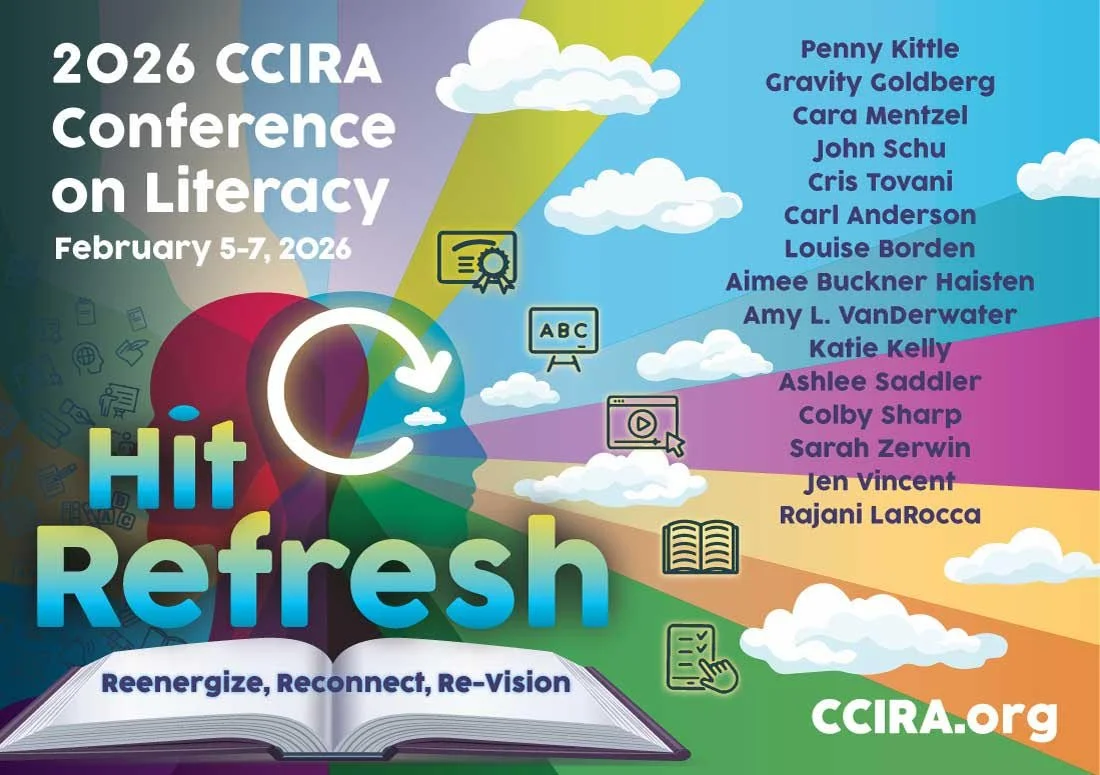NEW in 2026!
CCIRA Is Adding Poster Sessions!!
Fill out the form below to submit a poster session proposal for the 2026 CCIRA Conference, Hit Refresh. We want attendees to be inspired and reenergized so they can support and encourage their students in new and meaningful ways. Do you have something literacy related to share? If so, submit a proposal by December 15th!
Poster Session FAQs
Poster sessions are beneficial aspects of academic conferences. CCIRA is proud to announce this exciting addition to the 2026 Conference on Literacy.
What is a poster session?
A poster session is a chance for current educators and/or students in an education-related program to highlight work and learning experiences in an interactive, risk-free way. It provides an opportunity to present and discuss in-the-field research, classroom projects, or to share student projects/work.
How does a poster session work?
During the poster session, conference attendees may wander between poster presentations. Presenters are expected to stand near their project to discuss their work with attendees in a casual, informal way. Participants can ask questions, listen to presenter(s) share their work, and have informal conversations about learners and learning. A project can be in collaboration with other educators if presenters choose to work as a team.
What are the benefits of a poster session?
A poster session provides a way to share learning with conference participants. A well-crafted exhibit is a way to synthesize information without preparing a formal presentation. Poster sessions allow a project to shine.
What are the poster session guidelines?
As you develop an exhibit, determine which aspects of your project are most interesting and relevant to the conference and its theme. Since CCIRA is a literacy conference, projects must focus on a content-specific area (reading, writing, mathematics, etc.) with a literacy focus.
It is important to communicate information visually and effectively. Usually a poster session includes clear visuals, simple text, purposeful examples, and plenty of white space. Effective posters provide information that can stand alone, especially given the fact that they will remain visible to participants throughout the conference.
What should a project include?
A title (subtitle if necessary)
Presenter’s name(s) and affiliation(s)
An inquiry question or topic of focus
Information and examples related to the focus (i.e., student work, classroom artifacts, research results, etc.)
A summary of the work and a conclusion, including research findings if applicable
The significance of the project (to you, to students, to the field, or to a particular group)
What to keep in mind?
The audience should be able to understand the key points or objectives of the project in a few minutes. Presenters must be available during designated times to highlight the project as participants do a “walk about” at the conference.
Where can I find more information about creating a poster session?
Several websites give practical advice on how to design an effective poster presentation:
How to Create a Research Poster: Poster Basics (NYU Libraries)
Poster Sessions (Colorado State University)
Designing Conference Posters (Colin Purrington’s blog)
Please note: A poster session DOES NOT have to be as research-oriented as some of these examples. Classroom projects and student work are welcomed and honored.
What design tips should be considered?
Your project should:
Be readable from a distance of 3 to 5 feet (At least 48-point font for titles and 36-point for body text and tables)
Include images to support your work and capture viewers’ interest - especially student work, when applicable
Limit text (800 words as a guideline); use headings, bulleted lists, and enumeration where possible
Include legible font styles (if using student-created work, make sure it’s legible)
Maximize readability, especially if using student work
Use color strategically and purposefully
Be free-standing (tables will be provided), using a trifold-type display or easels (easels must be provided by presenter)
Do I need to attend the conference?
You must register for and attend the conference but, like all proposal speakers, you will not be compensated for your time. CCIRA cannot accommodate virtual presentations and is not responsible for the poster or materials you include in your presentation.
All presentations must align with CCIRA’s vision and mission. CCIRA reserves the right to deny participation should the project and its contents not align with its objectives. Participants may not advertise for-profit materials nor collect money from participants. Handouts are acceptable if they follow CCIRA’s guidelines. Please make sure permission is granted to display photographs, school information, student work, etc.
What about set up?
You are responsible for transporting your display and materials to and from the convention site. The project must be displayed before 7:00 a.m. on Thursday, February 5th and taken down after 5:00 p.m. on Friday, February 6th. The display space is limited and your work must fit comfortably on a shared six-foot banquet table.
How will I present?
You will present your work and interact with attendees on Thursday and Friday from 7:30-8:30 a.m. A presenter(s) must be available during that time. Presentations can be casual in tone, but presenters should act and dress professionally. We will send session details to presenters when the list of poster sessions is finalized.

